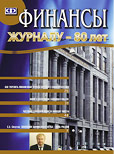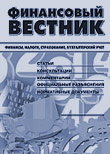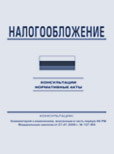Содержание
Налоги: теория и практика
В.Г. Пансков, профессор Финансового университета, государственный советник налоговой службы I ранга, доктор экономических наук, Заслуженный экономист РФ
E-mail: 5868116@mail.ru
Статья посвящена отображению принципов налогообложения в экономической теории, начиная с А. Смита, и законодательных актах, включая налоговые кодексы и конституции разных государств, с экскурсом в историю. Автор считает, что к настоящему времени в России предлагается чрезмерно большое число таких принципов, что умаляет их практическую значимость. Вместе с тем данный вопрос остается недоисследованным, ему уделяется мало внимания и в учебном процессе. Автор предлагает свой перечень основополагающих принципов.
Ключевые слова: принципы налогообложения, классификация, теоретические подходы, законодательное закрепление.
Финансы и бюджет
Н.И. Малис, профессор департамента налоговой политики и таможенно-тарифного регулирования Финансового университета при Правительстве РФ, заслуженный профессор университета
E-mail: Malis.nina@mail.ru
Автор сформулировал ряд предложений о том, как пополнить доходную часть региональных бюджетов, исходя из того, что налоги служат здесь главным источником. Анализируется уровень обеспечения бюджетов субъектов Федерации. В плане реформирования налоговой системы РФ первоочередными должны стать меры по упорядочиванию налоговых льгот и отмене неэффективных, после соответствующей их оценки. Неработающим назван текущий режим налогообложения игорного бизнеса.
Ключевые слова: региональные бюджеты, трансферты, налоговые доходы, налоговые льготы, эффективность.
Казначейство: становление и развитие
А.В. Ермоленко, начальник отдела предварительного контроля департамента казначейского исполнения бюджета Комитета финансов Ленинградской области
М.И. Канкулова, профессор кафедры государственных и муниципальных финансов Санкт-Петербургского государственного экономического университета, доктор экономических наук
E-mail: kankulova@mail.ru
В статье обобщены результаты анализа проблем и возможностей повышения эффективности контрольной деятельности финансовых органов субъектов РФ. Резерв для преодоления выявленных проблем и ограничений – корректировка технологических процедур с использованием всех преимуществ современного уровня информационно-телекоммуникационного обеспечения; внедрение риск ориентированного подхода в выстраивании бизнес процессов принятия к учету бюджетных обязательств и оплаты денежных обязательств с опорой на положительный опыт Федерального казначейства; совершенствование регламентов взаимодействия с органами государственного финансового контроля.
Сформулирован вывод, что современное технологическое обеспечение осуществления контрольных полномочий позволяет финансовым органам минимизировать риски нецелевого характера использования средств и нарастания кредиторской задолженности. При этом остается не в полной мере реализованным их потенциал содействия повышению эффективности управления государственными финансами посредством совершенствования контрольных процедур. Внесены предложения по преодолению выявленных ограничений.
Ключевые слова: финансовые органы, государственный финансовый контроль, предварительный контроль, санкционирование операций, бюджетные риски, предоставление средств под потребность, казначейское сопровождение.
Информация о заседании, состоявшемся 26 декабря 2017 года.
Страхование
В.Ю. Балакирева, заместитель руководителя департамента финансовой политики Минфина, кандидат экономических наук
E-mail: Vera.Balakireva@minfin.ru
Автор критически оценивает текущее состояние страхового рынка в РФ, отмечая, с одной стороны, уход с рынка многих страховых организаций, сопровождаемый сокращением доступности страховых услуг для населения, с другой – сохранение приемлемой рентабельности страхового бизнеса. К числу положительных моментов относится преобладание в структуре премий добровольных видов страхования (80%), а негативных – рост издержек и расходов страховщиков. В статье перечисляются как уже принятые страховые законодательные акты, так и готовящиеся изменения в законодательную базу. Автор коснулся также интеграции страховых рынков стран Евразийского страхового союза.
Ключевые слова: страховые премии, диверсификация рисков, рентабельность спрос на страховые услуги, закон ОСАГО, законотворческая работа.
С.Ю. Янова, заведующая кафедрой банков, финансовых рынков и страхования Санкт-Петербургского государственного экономического университета, профессор, доктор экономических наук
E-mail: yanova.s@unecon.ru
В статье приводится анализ предложений Концепции внедрения риск-ориентированного подхода к регулированию страхового сектора в Российской Федерации, разработанной ЦБ РФ. Основное внимание уделяется вопросам применимости положений Европейской Директивы Solvency II для отечественных страховых организаций. Очерчены зоны повышенного риска для страхового рынка и направления методического обеспечения реализации концепции. Рассказывается об опыте исполнения названной директивы в европейских странах.
Ключевые слова: риск-ориентированный подход к регулированию, страхование, страховой рынок, требования к размеру дополнительного капитала, маржа платежеспособности, риск андеррайтинга.
А.П. Архипов, профессор РЭУ им. Г.В. Плеханова, Финансового университета при Правительстве РФ, доктор экономических наук
E-mail: aarkhipoff@yandex.ru
В статье описаны основные принципы обязательного медицинского страхования в США, условия ценообразования, особенности медицинских программ, принятых в 2014-17 гг. и планы администрации Д. Трампа по его реформированию. На основе результатов рейтингования национальных систем здравоохранения США и России делается вывод о сходстве в этих странах проблем, возникающих при использовании обязательного медицинского страхования как инструмента финансирования здравоохранения и важная роль государственного контроля над процессом ценообразования при оказании медицинской помощи.
Ключевые слова: доступность медицинской помощи, медицинское страхование, стоимость медицинского полиса, франшиза, сострахование.
Финансовые рынки
Беседа с
О.В. Березовым, генеральным директором Финансово-банковской ассоциации ЕвроАзиатского сотрудничества
E-mail: roa@fbacs.com
О.В. Березовой отвечает на вопросы редакции журнала о вкладе возглавляемой им ассоциации в процессы евразийской финансово-экономической интеграции, соотношении в ней европейского и восточного направлений, подключении к этим процессам малого и среднего бизнеса. Также подводятся итоги IV Московского международного финансово-экономического форума (декабрь 2017), который в очередной раз стал площадкой для встречи финансового и промышленного капитала, обсуждения возможностей, открываемых цифровыми технологиями и финтехом. Отмечается пассивность российского страхового бизнеса.
Ключевые слова: евразийская товарно-сырьевая биржа, финансово-экономическое сотрудничество, формат, РСПП, Международный экономический сенат, реальный сектор, страхование экспортных кредитов, платежи, клиринг.
И.П. Хоминич, профессор кафедры «Финансовые рынки» Российского экономического университета им. Г.В. Плеханова, доктор экономических наук
E-mail: 9204977@mail.ru
О.В. Саввина, профессор кафедры «Финансы и цены» Российского экономического университета им. Г.В. Плеханова, доктор экономических наук
E-mail: osavvina@yandex.ru
В статье показано влияние одностороннего смягчения стандартов регулирования финансовых рынков в США на трансформацию глобальной системы финансового регулирования. Проанализированы наиболее значимые положения реформы «реформы» финансового регулирования в США, способные привести к рассогласованию действий финансовых регуляторов по управлению системными финансовыми рисками, а также разрушению системы предупреждения финансовых кризисов.
Ключевые слова: финансовое регулирование, глобальные финансовые реформы, глобальный финансовый кризис, системный финансовый риск.
М.В. Прянишникова, к.э.н., доцент кафедры финансов Саратовского социально-экономического института (филиала) РЭУ им. Г.В. Плеханова
E-mail: marprya@mail.ru
В работе исследуется структура современного механизма организованной торговли ценными бумагами и основные методы торговли, применяемые на внебиржевом рынке. Задачами работы являются систематизация методов в соответствии со сферами внебиржевого рынка и выявление основных элементов торгового механизма. В процессе исследования применялись общепризнанные принципы диалектического познания, абстрактно — логический и монографический методы. Научная новизна состоит в обосновании определения современной внебиржевой организованной торговли ценными бумагами как независимого механизма, состоящего из торговых, инфраструктурных и обуславливающих его работу элементов, изучении и анализе состава торгового механизма.
Ключевые слова: внебиржевой рынок ценных бумаг, организованный рынок, сфера, торговый механизм, методы торговли.
Корпоративные финансы
В.Д. Газман, профессор НИУ «Высшая школа экономики»
E-mail: garantinv@bk.ru
В статье рассматривается грядущая смена энергетических генераций. Автор считает это направление инвестиционной лизинговой деятельности одним из наиболее затрудненных при проектировании и в то же время чрезвычайно перспективным в ближайшие годы при смене энергетических генераций в пользу приоритета возобновляемых источников энергии. Представлены основные показатели, характеризующие результаты строительства электростанций возобновляемой энергетики на основе собранных автором данных по 215 проектам, анализируется опыт Италии – одной из крупнейших в Европе стран по использованию возобновляемой энергетики. В статье рассмотрена возможность и перспективность использования различных видов лизинга для возобновляемой энергетики, в т.ч. финансового лизинга, оперативного лизинга, леверидж-лизинга, проектного финансирования.
Ключевые слова: возобновляемые источники энергии, финансовый лизинг, леверидж-лизинг, проектное финансирование, ускоренная амортизация.
Юбилей
Н.Г. Иванова, заведующая кафедрой государственных и муниципальных финансов СПбГЭУ, профессор, доктор экономических наук
E-mail: Finance-journal@mail.ru
Юбилейные заметки о творческом пути петербургского ученого, его вкладе в подготовку финансовых кадров и развитие налоговой системы пореформенной России.
Ключевые слова: налоговый учебник, прогрессивная шкала, НДС, налоговый мониторинг, трансфертное образование.
Annotation
Editorial article
Federal budget of the Russian Federation after a year break was again adopted for three years, it tells about reduction of the level of uncertainty regarding the main priorities, mechanisms and principles of realization of fiscal policy. It will provide more predictability of macroeconomic conditions and business environment. Law on federal budget was adopted in the third final reading on 9th of December 2016 at the plenary session of the State Duma of the Russian Federation. Federal Law “On the Federal budget for 2017 and planned period of 2018 and 2019” adopted by the State Duma was approved by the Council of Federation on 14 of December, signed by the President of the Russian Federation V.V. Putin on 20 of December 2016. Article summarizes the results of 2016 and highlights the main features of the new federal budget.
Keywords: expenses, incomes, inflation, debt market, taxes, social obligations, pension reform, intergovernmental relations.
M.I. Ermilova, associate professor of chair “Financial Management” of the Plekhanov Russian University of Economics, candidate of economic sciences.
E-mail: fin-lab@inbox.ru
Article presents models of financing of modern Russian housing market. It was revealed that each of these models have a number of advantages and disadvantages that doesn’t allow it to develop sufficiently. It was determined that the most promising model in the long term period would be housing cooperatives and in the short term – mortgage lending. It’s important that some models interact with each other, for example mortgage and equity construction, however it’s not enough. It’s necessary to build an effective system of interaction of all models of housing market financing between each other in order to solve some economic and social problems of the state. Also it’s significant to define the essence of each model in order to avoid incorrect interpretation and application in practice of each of them. Increase of the role of budget financing will allow implementing the greater number of housing programs and increasing the effectiveness of use of each presented models of market financing.
Keywords: housing market, financing of housing market, mortgage, equity construction, budget financing, housing lease, housing cooperatives.
A.A. Mikhailova, head of department of the Institute for Public Finance Reform, associate professor of chair “State regulation of economy” of the RANEPA, candidate of economic sciences
E-mail: aam@irof.ru
D.A. Uskov, head of department of the Institute for Public Finance Reform
E-mail: dau@irof.ru
Article considers the questions of financing of fundamental surveys and also domestic expenditures on research and development in the Russian Federation. Conclusions about the main problems and prospects of financing of science development are made.
Keywords: budgetary financing, fundamental research, costs on researches and development.
Solemn meeting dedicated to the 90th anniversary of the “Finance” journal
E-mail: Finance-journal@mail.ru
Published notes are devoted to the main stages of activities of the journal, from the formal point of view this magazine was established in the years of NEP, but actually had deeper historical roots and ties connecting it with the Ministry of Finance of pre – revolutionary Russia. The Ministry of Finance is the main co – founder of the journal, its heads are regularly published on the magazine’s pages. Article provides the extracts from the speeches of participants of the meetings, which pay tribute to the contribution of editorial and authors team in financial science and practice, qualification improvement of the Treasury employees and other departments, training of specialists for insurance industry. This paper provides the information about high impact – factor of RINTS and wide citation of articles published in the journal.
Keywords: financial system of Russia, history, themes and topics, readership, market of print editions.
Information about the Council meeting held on 13 December 2016.
Victor van Kommer, Director Tax Services at the International Bureau of Fiscal Documentation, professor, doctor of sciences. (Netherlands)
Matthijs Alink, Professor of the Utrecht University, Senior Advisor to the Centre for Tax Policy and Administration of the OECD. (Netherlands)
E-mail: finvestnik@mail.ru
General principles and rules of risk – management and compliance are applied to all types of taxpayers, but the authors consider them in relations to large business. Article provides the factors and benchmarks which are taken in account by the tax services conducting supervision over observance of the tax law by corporations. Authors pay considerable attention to the tax aspects of global economic relations (touching the subject of global non - compliance) and cross – border transactions of large companies.
Keywords: compliance, risk management, tax risks, corporate policy, tax administration.
E-mail: finvestnik@mail.ru
Material is devoted to the analysis of the results of work conducted by the FTS of Russia in 2016. They confirm the reputation of the service as an effective manager, data – mover, fully ready to perform new tasks in particular in the field of administration of insurance payments. Heads of FTS share their assessments of process of transition to the cadastral value, represent tasks for 2017.
Keywords: tax administration, budget, income dynamics, databases, VAT.
According to the preliminary data VAT in 2016 displaced Extraction tax from the first place. How was explained by the analysts of FTS VAT is the tax on final consumption reflecting the dynamics of the main macroeconomic factors.
Keywords: taxes, VAT and Extraction tax, shadow sector.
E-mail: finvestnik@mail.ru
At the end of December 2016 tax conference “The Moscow Times” once again became a platform for exchange of views of representatives of the Ministry of Finance of Russia, FTS, Moscow Government and business community about current tax policy, planned and upcoming changes in the tax legislation. Tax experts of IT companies spoke about the taxation of virtual services and tax burden on payroll of technology companies which in recent years significantly increased the volume of export of their services also because of tax benefits, overlapping non – received by budget tax revenues from this sector.
Keywords: tax base, tax monitoring, country reporting, sales tax, patents.
E.S. Grebenshchikov, candidate of historical sciences.
E-mail: finvestnik@mail.ru
The proclaimed mission of the Pool is to provide businesses and citizens of the Russian Federation (and some other countries as well) with reliable insurance protection and competitive insurance and reinsurance conditions against the risks of "terrorism" and "sabotage." Current insurance capacity of the pool which has 23 private member companies is $240 mln. The pool is going to broaden the specter of its services by including into the cover cyber-risks and war risks as well. The risk of terrorism has acquired global character so the response of the insurance industry should also be global through the retrocession of reinsured risks to such players as Lloyd’s of London. RATIP notes that so far it failed to reach agreement with the newly established Russian national reinsurance company on cooperation through the provision of the capacity by the latter.
Keywords: antiterrorist cover, reinsurance pool, Extremus, Belorussian national Reinsurance organization, insurance capacity.
E.S. Grebenshchikov, candidate of historical sciences.
E-mail: finvestnik@mail.ru
Article on the basis of extensive statistical material and with engagement of a wide range of sources introduced firstly provides analysis of development of Chinese insurance industry after economic reforms, characterizes achieved degree of maturity of Chinese insurance market, its qualitative and quantitative parameters indicating imbalance and unevenness of insurance distribution. The following points are considered: specific problems faced by the market regulators and insurers at this stage, progress and results of some experiments including introduction of micro – insurance, reform of supervision and taxation of insurance operations (transition to VAT). Separate sections are devoted to regulation of investment activity of insurance companies, internationalization of Chinese insurance business and state of cooperation between China and Russia in insurance sector.
Keywords: absolute and relative indicators, insurance premium collection, regulation, regulatory requirements, micro – insurance, reinsurance, VAT on insurance operations.
A.S. Kovalevskaya, leading research officer, Center for Budgetary Policy, Financial Research Institute, Moscow, Russian Federation, candidate of economic sciences.
O.A. Feoktistova, leading research officer, Center for Budgetary Policy, Financial Research Institute, Moscow, Russian Federation, candidate of economic sciences.
E-mail: feoktistova@nifi.ru
The article presents the results of a study conducted by the Financial Research Institute commissioned by the Russian Federation Ministry of Finance. The authors describe occupational diseases and injuries compensation schemes development and functioning in OECD, BRICS, CIS and some other countries, organizational forms, rules for premium and benefits, as well as accidents and occupational diseases prevention.
Keywords: occupational diseases and injuries compensation schemes, insurance premium, insurance benefits, occupational diseases and injuries prevention within accidents insurance systems.
M.V. Zharikov, Candidate of Economic Sciences, Associate Professor, Department of Management, Moscow Technological Institute.
E-mail: michaelzharikoff@gmail.com
The purpose of writing this article is to analyze the development process of the BRICS’ currencies internationalization and work out approaches and instruments to its optimization. The significance of the article is in the necessity to deepen BRICS’ integration in the world system of currency and finance within the existing world order on the basis of multidimensional approach to internationalizing their currencies, expanding their use in international and regional settlements, organizing their trade on stock exchanges, creating offshore currency centers as well as institutions forming the network of financial stability in addition to the International Monetary Fund and the World Bank. The practical importance of the research is that its major outcomes contain the recommendations realizing which may lead in the long run to strengthening the status of the BRICS’ currencies in the world system of currency, their place and role in the architecture of international financial institutions.
Keywords: multidimensional internationalization of the BRICS’ currencies, approaches to optimizing gains and costs of internationalizing the BRICS’ currencies, yuan’s offshore center in Moscow.
O.A. Firsova, researcher of the Advanced Financial Planning, Macroeconomic Analysis and Finance Statistics Center, Financial Research Institute.
E-mail: firsova@nifi.ru
The article analyzes the tax system in Italy. The focus is on direct taxation. The measures, which implemented in the country, for increasing the efficiency and competitiveness of the tax system, are considered.
Keywords: tax system in Italy, tax burden, long-term fiscal stability, fiscal policy, tax reform, tax base, tax rate.
E.S. Grebenshchikov, candidate of historical sciences
E-mail: finvestnik@mail.ru
Summary of presentations at the XIV Regional Investment Congress organized by the rating Agency RAEX (Expert RA) in December 2016. The event was held under the slogan: development of the regions in the conditions of budget financing reduction – in hands of the regions. Review helps to understand what exactly is in these hands, how regions adapt to the new conditions and work with domestic and foreign investors. Regional approaches and models are very variety especially in successful regions. There were discussed not only success factors, about 25 regions of the country were recognized as investment – attractive, but also faults. Speakers agreed that financial policy of the regions shouldn’t be the fight for redistribution of federal means and provision of benefits at local level should be justified and transparent process with selection of sectoral priorities.
Keywords: ratings, support programs, investment projects, risks, diversification.













